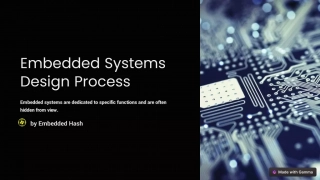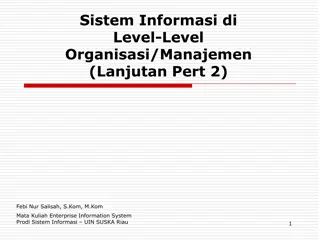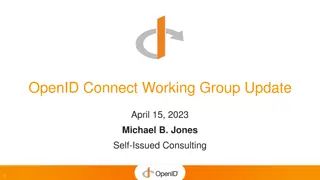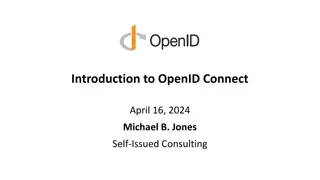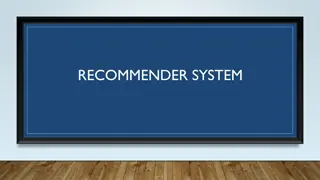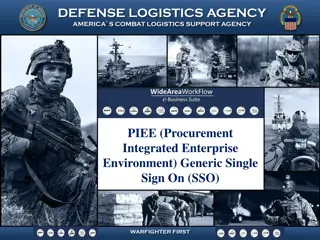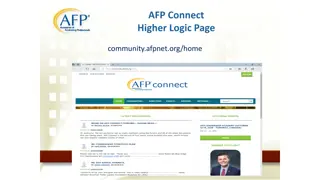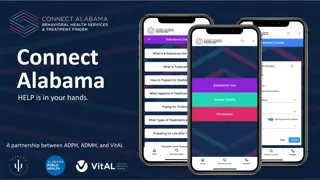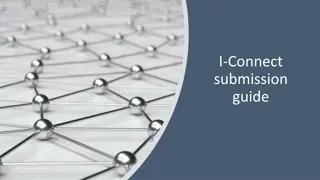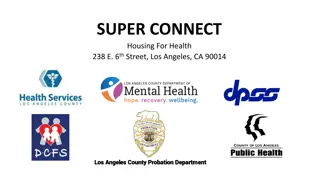All systems connect
The Africa Regional Programme session to explore systems challenges and solutions for advancing progress towards universal WASH services in Africa. Learn about the current status and future goals for drinking water, sanitation, and hygiene in Africa.
Download Presentation

Please find below an Image/Link to download the presentation.
The content on the website is provided AS IS for your information and personal use only. It may not be sold, licensed, or shared on other websites without obtaining consent from the author.If you encounter any issues during the download, it is possible that the publisher has removed the file from their server.
You are allowed to download the files provided on this website for personal or commercial use, subject to the condition that they are used lawfully. All files are the property of their respective owners.
The content on the website is provided AS IS for your information and personal use only. It may not be sold, licensed, or shared on other websites without obtaining consent from the author.
E N D
Presentation Transcript
Africa Regional Programme, One For All Advancing progress towards universal WASH services in Africa A high-level session highlighting systems challenges and solutions in Africa
Introduction Jane Nabunnya Mulumba IRC Uganda Country Director Session moderator
Tom Slaymaker, WHO/UNICEF Joint Monitoring Programme Progress on drinking water, sanitation and hygiene in Africa 2000-2020: five years into the SDGs Advancing progress towards universal WASH services in Africa tslaymaker@unicef.org washdata.org
SDG service ladders for WASH in households DRINKING WATER SANITATION HYGIENE Safely managed: Drinking water from an improved source that is accessible on premises, available when needed and free from faecal and priority chemical contamination Basic service: Drinking water from an improved source, provided collection time is not more than 30 minutes for a round trip, including queuing Limited service: Drinking water from an improved source, for which collection time exceeds 30 minutes for a round trip, including queuing Unimproved: Drinking water from an unprotected dug well or unprotected spring Safely managed: Use of improved facilities that are not shared with other households and where excreta are safely disposed of in situ or removed and treated offsite Basic service: Use of improved facilities that are not shared with other households Improved Basic service: Availability of handwashing facility with soap and water at home Limited service: Use of improved facilities that are shared with other households Limited service: Availability of handwashing facility lacking soap and/or water at home Unimproved: Use of pit latrines without a slab or platform, hanging latrines or bucket latrines No facility: No handwashing facility at home Surface water: Drinking water directly from a river, dam, lake, pond, stream, canal or irrigation canal Open defecation: Disposal of human faeces in fields, forests, bushes, open bodies of water, beaches or other open places, or with solid waste
3 out of 5 people in Africa lacked safely managed drinking water services in 2020
Only 3 out of 46 countries with <99% coverage are on track to achieve universal access to at least basic drinking water by 2030
Nearly 3 out of 4 people in Africa lacked safely managed sanitation services in 2020
Only 2 out of 48 countries with <99% coverage are on track to achieve universal access to at least basic sanitation by 2030
3 out of 5 people in Africa lacked basic hygiene services in 2020
In Africa there are large disparities in access to basic hygiene services between and within countries
Data availability is improving but many countries in Africa still lacked estimates for SDG indicators in 2020 % of population (# of countries, areas and territories) covered by available data in 2020 Drinking water Sanitation Hygiene Free from contaminatio n 45% (136) Safely disposed in situ 66% (67) Safely managed Accessible on premises Available when needed Open defecation Basic sanitation Safely managed Emptied and treated Wastewater treated Basic water Basic hygiene World (232) 99% (209) 45% (136) 99% (208) 82% (121) 97% (196) 99% (200) 81% (120) 1% (7) 52% (97) 50% (79) Rural 98% (164) 55% (65) 98% (163) 86% (91) 55% (65) 97% (159) 98% (161) 73% (77) 70% (58) 0% (1) 8% (5) 67% (78) Urban 93% (173) 56% (85) 93% (171) 75% (108) 56% (85) 94% (170) 94% (170) 75% (98) 62% (51) 0% (1) 48% (28) 37% (76) African Union (55) 100% (50) 53% (21) 100% (50) 94% (38) 53% (21) 99% (50) 99% (50) 66% (26) 55% (23) 0% (0) 51% (10) 91% (37) Rural 99% (49) 52% (21) 99% (49) 93% (35) 52% (21) 99% (48) 99% (48) 79% (29) 64% (28) 0% (0) 70% (2) 89% (36) Urban 98% (49) 66% (26) 98% (49) 93% (38) 66% (26) 98% (49) 98% (49) 66% (25) 62% (23) 0% (0) 55% (4) 87% (36) Notes: 1. Proportion of the relevant population for which data are available. 2. Cases where the population coverage if less than 50% are highlighted in yellow.
Achieving SDG WASH targets in Africa will require a dramatic acceleration in current rates of progress
Achieving the 2030 SDG targets in Africa will require 12x increase in current rate of progress on safely managed drinking water 20x increase in current rate of progress on safely managed sanitation 42x increase in current rate of progress on basic hygiene services Between 2000 and 2020 Africa s population increased from 800 million to 1.3 billion 500 million people gained access to at least basic water services 290 million people gained access to at least basic sanitation services But in 2020 411 million lacked basic water services 779 million lacked basic sanitation services (incl. 208 million open defecators) 839 million still lacked basic hygiene services Only 7 out of 42 countries on track to eliminate open defecation by 2030 Significant inequalities between and within countries 3 out of 4 in rural areas lack safely managed water and sanitation Large gaps between richest and poorest and sub-national regions Data availability is improving but large gaps remain 21 African countries with estimates for safely managed drinking water, 26 for safely managed sanitation and 37 for basic hygiene in 2020 Thank you! info@washdata.org
Regional and country level progress: national level examples
Mr. Bocoum Djoouro Mr. Vincent de Paul Mugwaneza, Director of Rural Water and Sanitation Services, Water and Sanitation Corporation-WASAC, Rwanda National Director of Hydraulics/ National Focal Point for SWA in Mali
Panel 1 National level panel discussion
Moderator Arnold Cole Senior WASH and Climate Specialist ESARO, UNICEF
Eng. Joseph Oriono Eyatu. Bobby Whitfield Abida Mia Sadik Minister of Water and Sanitation, Malawi Dereje Duguma Gemeda State Minister, Ministry of Health, Ethiopia Director, Directorate of Water Development, Ministry of Water and Environment (MWE), Uganda Chairman and CEO, National Water, Sanitation and Hygiene Commission, Liberia
Panel 2 Regional level panel
Moderator Cate Nimanya Water For People
Mr Osward Chanda Dr Sim on Kenfack Chief of Water department, African Development Bank Director of Programs, AFWASA
Highlights of the discussion and concrete next steps Juste, Hermann NANSI Director Africa Hub, IRC





